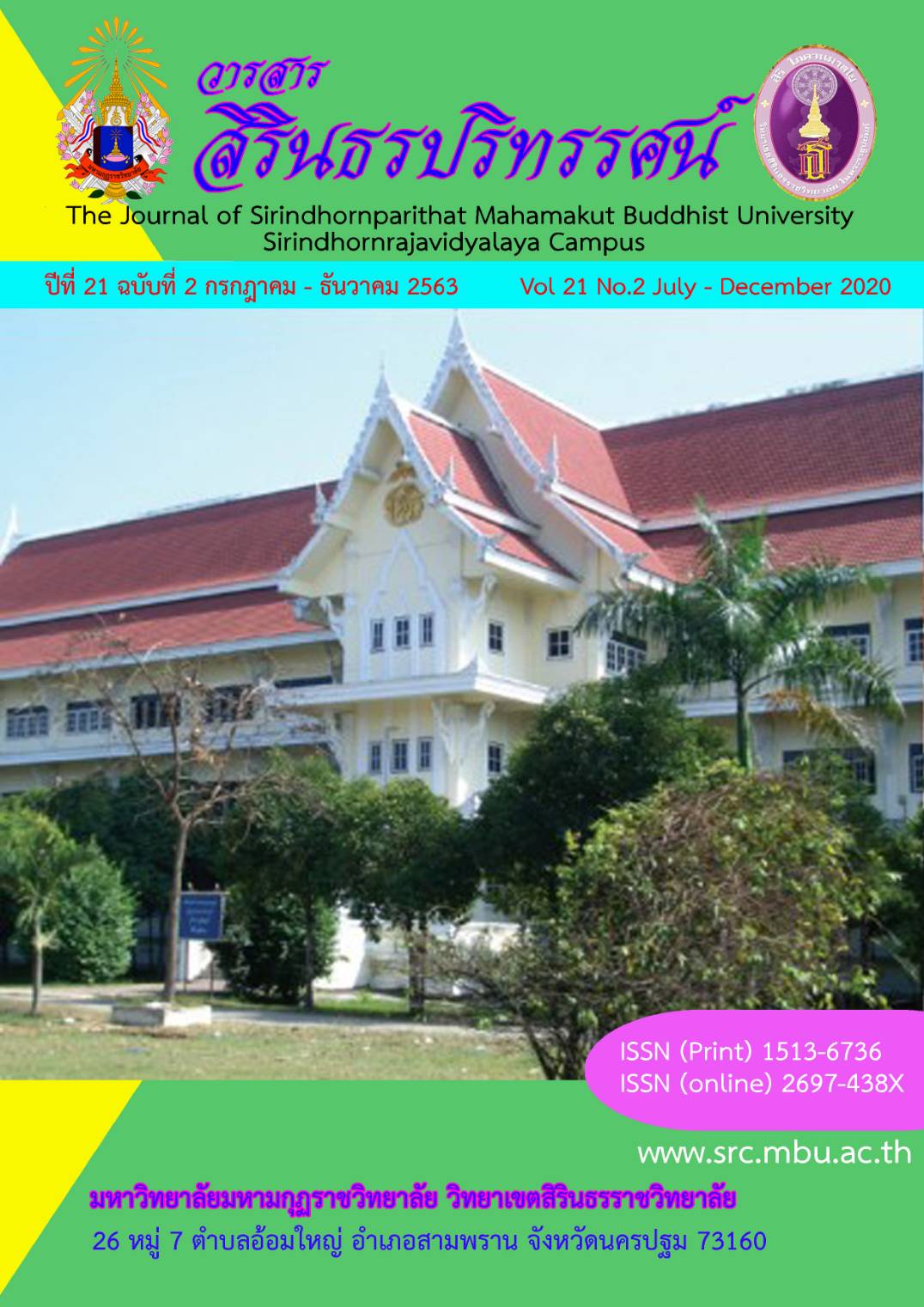The Role of Energy in Russian Federation Foreign Policy towards The Islamic Republic of Iran from 2000 until Today
Keywords:
Energy, Foreign policy, Russian Federation, The Islamic Republic of IranAbstract
This research paper aims to study 1) the role of energy in Russian foreign policy towards The Islamic Republic of Iran from 2000 until today; 2) factors influencing strategy implementation of energy use in establishing Russian foreign policy towards Iran from 2000 until today; and 3) future trends in Russian foreign policy towards Iran. A case study method was used, examining specific events at a given time with documentary and data analyses from primary and secondary sources in the form of books, articles, and relevant documents. An analytical framework was examined by a concept of National Interest and Heartland Theory.
Results were that energy plays a significant role in Russian national advancement through operations under the framework of Russian foreign policy towards Iran. Especially since 2000, President Vladimir Putin has used energy as an important strategy for constructive involvement with Iran. To achieve economic and state security benefits, Russia recognizes that Iran is an important competitor in the world energy market as well as a necessary ally for maintaining peace and Russia’s status as a world and regional superpower. Considering the relevant documents and interviews from Russian and Iranian foreign policy experts, the influencing factor Following the implementation of the energy strategy to formulate Russia's foreign policy against Iran between 2000 and present, including 1) setting up an energy export-import infrastructure that Russia and Iran are stakeholders 2) Caspian Sea Management And 3) Iran's nuclear program. Russia wants to expand its influence through oil and gas pipelines and foreign investment in the energy industry in the Caspian Sea and the Eastern Mediterranean. This makes Russia and Iran both major allies and competitors in the world of energy and geopolitics. Only the nuclear development program Iran have to rely on the status of a member of the Russian Security Council in the United Nations to mitigate influence and sanctions from other powers, which Russia is very cautious in pursuing Iran's nuclear policy. It could turn into a Russian threat in the future. Therefore, Russia's foreign policy trend towards Iran. In order to maintain the status of superpower and the solidarity of power in the region which is part of the heartland through its role in energy. This means Russia must adjust its foreign policy towards Iran according to timely imperatives, alternately collaborating with and impeding Iran’s influence simultaneously. Russia's foreign policy approach towards Iran will continue to use energy as a creative instrument as part of its ambitious future geopolitical, political, and security goals.
References
โกวิท วงศ์สุรวัฒน์. (2527). ภูมิรัฐศาสตร์มิติใหม่. กรุงเทพฯ : แพร่พิทยา. หน้า 146 – 166
จิตติภัทร พูนขำ.(2 มีนาคม 2561). การเมืองรัสเซียยุคปูติน 4.0 : สู่กับดักชราธิปไตย?.the101.world.[ระบบออนไลน์]. สืบค้นเมื่อ 18 ธันวาคม 2562. จาก https://www.the101.world/putin-4-0/.
ทิพรัตน์ บุบผะศิริ. รัสเซียในการเมืองระหว่างประเทศในยุโรปตะวันออก ยุคหลังสงครามเย็น.วารสารรัสเซียศึกษา.ปีที่ 3 ฉบับที่ 1 (2555). กรุงเทพฯ : โรงพิมพ์แห่งจุฬาลงกรณ์มหาวิทยาลัย. 2555. : 120.
มณีมัย รัตนมณี.(2519) ความสัมพันธ์ระหว่างประเทศ. กรุงเทพฯ : ไทยวัฒนาพานิช. หน้า 52-53.
รมย์ ภิรมนตรี. รัสเซียในทศวรรษหน้า. วารสารรัสเซียศึกษา.ปีที่ 2 ฉบับที่ 1-2 (2554). กรุงเทพฯ : โรงพิมพ์แห่งจุฬาลงกรณ์มหาวิทยาลัย. 2554. : 195-196.
รมย์ ภิรมนตรี. สัมภาษณ์โดย จุฑามาศ บุตรดีลา, ศูนย์รัสเซียศึกษาแห่งจุฬาลงกรณ์มหาวิทยาลัย, 13 มกราคม 2563.
ศราวุฒิ อารีย์. สัมภาษณ์โดย จุฑามาศ บุตรดีลา, ศูนย์มุสลิมศึกษา สถาบันเอเชียศึกษา จุฬาลงกรณ์มหาวิทยาลัย 4 มิถุนายน 2563.
Abbas Milani. (2016). Russia and Iran: An Anti-Western Alliance?. Stanford University. [Online].
Retrieved November 27, 2019, from http://web.stanford.edu/group/abbasmilani/cgi-bin/wordpress/wp-content/uploads/2016/03/Russia-and-Iran-An-Anti-Western-Alliance_.
European Parliament: European Parliamentary Research Service. (2018). energy as a tool of the foreign policy of authoritarian states, in particular Russia. European Parliament. : 8-11. [Online]. Retrieved February 2, 2020, from https://www.europarl.europa.eu/RegData/etudes/STUD/2018/603868/EXPO_STU(2018)603868_EN.pdf.
Gazprom. (2020). Blue Stream. [Online]. Retrieved June 22, 2020, from https://www.gazprom.com/projects/blue-stream/.
Giorgi Lomsadze. (Jun 4, 2015). “Gazprom to over Iranian – Armenian Pipeline”. Eurasianet.[Online]. Retrieved May 20, 2020, from https://eurasianet.org/gazprom-to-take-over-iranian-Armenian-pipeline.
H. J. Mackinder. (1904) “The Geographical Pivot Of History”. The Geographical Journal. Vol 23, No.4 (Apr.,1904) : 421-437.
Henry Foy. (August 9, 2018). Caspian countries ready to end their sea of troubles. Financial Times. [Online]. Retrieved May 30, 2020, from https://www.ft.com/content/3d52c160-9af1-11e8-9702-5946bae86e6d.
James N. Rosnau. (1968). International Encyclopedia of the Social Science. (New York: Macmillan Company & the Free Press) : 34.
Joseph Frankel. (1979). International Relation in a Changing World. Oxford: Oxford University Press. : 86.
Laura Solanko. (2011). Why Energy Efficiency is Vitally Important for Russia. International Association for Energy Economics. [Online]. Retrieved June 15, 2020, from https://www.iaee.org/en/publications/newsletterdl.aspx?id=122.
Mansoureh Ebrahimi, Ahmadali Gholami, and Kamaruzaman Yusoff. (2018). Politics of Oil and Natural Gas vis-à-vis the Foreign Policy of Iran. Taylor & Francis Online. : 79 [Online]. Retrieved June 5, 2020, from https://www.tandfonline.com/doi/abs/10.1080/25765949.2017.12023310.
Mona Dinpajouh. (2009). Russian foreign policy towards Iran under Vladimir Putin: 2000 – 2008. Middle East Technical University. [Online]. Retrieved July 20, 2020,
from https://open.metu.edu.tr/handle/123456789/18710.NTI. (January 2020). Nuclear. [Online]. Retrieved June 10, 2020,
from https://www.nti.org/learn/countries/iran/nuclear/.President of Russia. “Fifth Caspian Summit”. August 12, 2018. Retrieved fromhttp://en.kremlin.ru/events/president/news/58296. May 30, 2020.
Thomas Robinsons. (1969). International Politic and Foreign Policy: A Reader in Research and Theory. New York Free Press: 1969. : 184-186.
Downloads
Published
Issue
Section
License
บทความที่ได้รับการตีพิมพ์เป็นลิขสิทธิ์ของ มหาวิทยาลัยมหามกุฏราชวิทยาลัย วิทยาเขตสิรินธรราชวิทยาลัย
ข้อความที่ปรากฏในบทความแต่ละเรื่องในวารสารวิชาการเล่มนี้เป็นความคิดเห็นส่วนตัวของผู้เขียนแต่ละท่านไม่เกี่ยวข้องกับหาวิทยาลัยมหามกุฏราชวิทยาลัย วิทยาเขตสิรินธรราชวิทยาลัย และคณาจารย์ท่านอื่นๆในมหาวิทยาลัยฯ แต่อย่างใด ความรับผิดชอบองค์ประกอบทั้งหมดของบทความแต่ละเรื่องเป็นของผู้เขียนแต่ละท่าน หากมีความผิดพลาดใดๆ ผู้เขียนแต่ละท่านจะรับผิดชอบบทความของตนเองแต่ผู้เดียว




